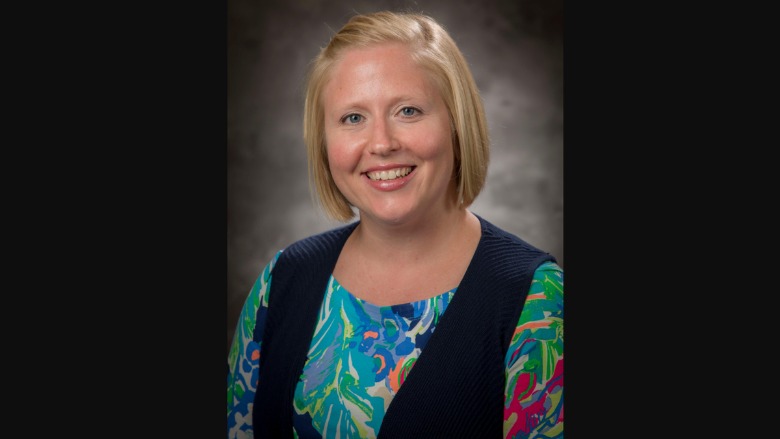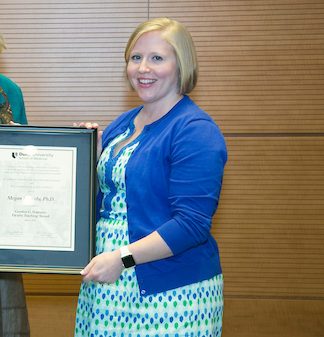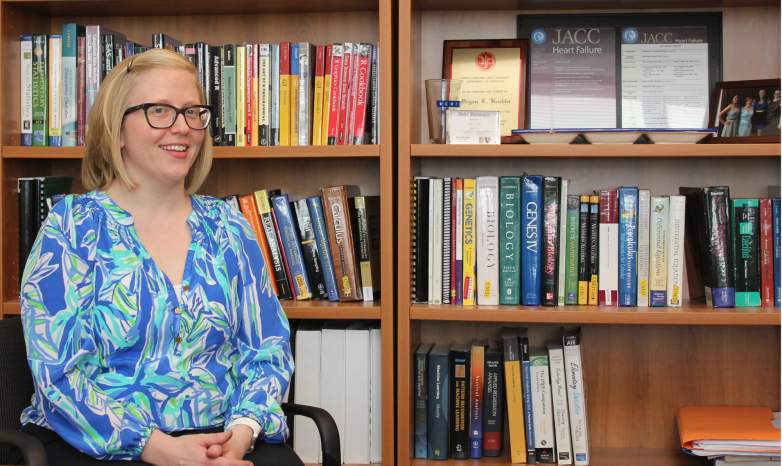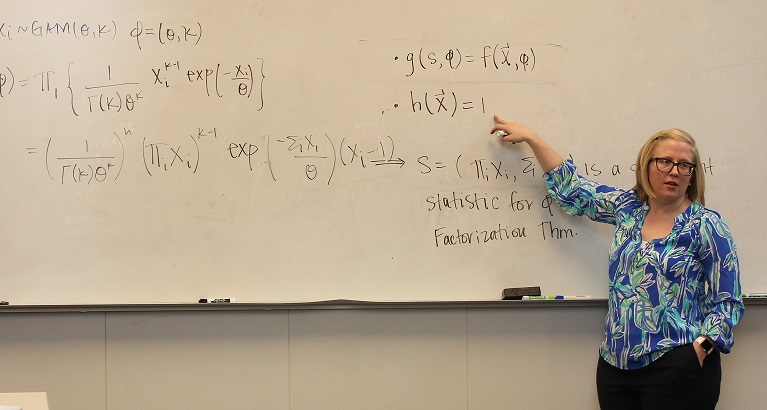
A Duke University professor has resigned from her position as the director of a graduate studies program in the School of Medicine after it was revealed she emailed Chinese students and warned them not to speak their native language in public because of “unintended consequences,” the Duke Chronicle reports.
Megan Neely, an assistant professor in the biostatistics and bioinformatics department at Duke, sent the email to all first- and second-year biostatistics graduate students in the program, but targeted international students, specifically Chinese students. The emails were shared on social media in both the U.S. and China, going viral on Twitter and the Chinese-version of the social media site, Weibo.
Neely said in the email she had been asked by two colleagues to identify international students they had observed speaking Chinese in common areas so that they could remember not to hire them if they applied for an internship or master’s project. Neely said in the note that she sent the email as a reminder to students to speak English whenever they were in a professional or public setting.
Neely, 35, resigned from her grad program position on Saturday after a report on the emails was published by the Duke Chronicle, the university’s student newspaper. The two professors who initially contacted Neely have not been identified publicly. Duke University officials have said a full investigation into the incident is still ongoing. Neely could not be reached for comment by Heavy.
In an email to students obtained by the Duke Chronicle, Neely wrote, “I deeply regret the hurt my email has caused. It was not my intention. Moving forward, it is my sincerest wish that every student in the Master of Biostatistics is successful in all of their endeavors.”
Department Chair Elizabeth DeLong said in the email to students that Neely’s notes were “not appropriate,” according to the Chronicle, and she added, “Although it was not meant to be hurtful, it came out that way and was clearly in error.”
Here’s what you need to know about Megan Neely and the email incident:
1. Neely Says Her Colleagues Told Her ‘They Were Disappointed’ the ‘Impolite’ Students Weren’t ‘Taking the Opportunity to Improve Their English’
Megan Neely sent out the email on to all first- and second-year biostatistics students on Friday, January 25, and it was posted on social media by Hua Sirui, a producer for @NowThisNews on Saturday, January 26. “One professor from Duke University sent out an email asking Chinese students not to speak Chinese in school building,” he wrote on Twitter along with screenshots of the emails, which you can see above. The email had the subject line “Something to think about…”
Neely said in the email she had received requests from two “separate faculty members” who wanted to identify students they had observed speaking Chinese in a student lounge and study areas. Neely said her colleagues asked if she had photos of the students in her program. She shared the photos with them and said they had both “picked out a small group of first-year students who they observed speaking Chinese (in their words, VERY LOUDLY) in the student lounge/study areas. I asked why they were curious about the student’s names.”
Neely wrote, “Both faculty members replied that they wanted to write down the names so they could remember them if the students ever interviewed for an internship or asked to work with them for a master’s project.”
Neely then bolded and underlined the next section of the email, writing, “They were disappointed that these students were not taking the opportunity to improve their English and were being so impolite as to have a conversation that not everyone on the floor could understand.”
Neely added, “To international students, PLEASE PLEASE PLEASE keep these unintended consequences in mind when you choose to speak in Chinese in the building. I have no idea how hard it has been and still is for you to come the US and have to learn in a non-native language. As such, I have the upmost respect for what you are doing. That being said, I encourage you to commit to using English 100% of the time when you are in Hock or any other professional setting.”
She closed the email, “Copying the second-year students as a reminder given they are currently applying for jobs. Happy to discuss more. Just stop by my office.”
2. A Second Email Sent by Neely in February 2018 Also Surfaced, in Which She Warned About the ‘Potential Downstream Effects’ of Speaking Chinese in Public
After the first email was shared on social media, a second email sent by Megan Neely to students in the graduate program surfaced later Saturday. That email was sent by Neely in February 2018 with the subject line “Speak English or To Not Speak English…” You can see a screenshot of the email in the tweet above.
In the email, Neely wrote, “I don’t like being the language police, but I have gotten these comments enough times in the past few weeks that I feel like I should share them with you. The most recent report is from the Chair of the Department…” Neely continued:
Many faculty have noticed international students not speaking English in the break rooms in the department. While I completely understand the desire to speak with friends in your native language, I wanted to provide a different viewpoint on why this might not be the best choice while you are in the department. Beyond the obvious opportunity to practice and perfect your English, speaking in your native language in the department may give faculty the impression that you are not trying to improve your English skills and that you are not taking this opportunity seriously. As a result, they may be more hesitant to hire or work with international students because communication is such an important part of what we do as biostatisticians. Bottom line: Continuing this practice may make it harder for you and future international students to get research opportunities while in the program.
Neely added, “Please keep these potential downstream effects in mind when you choose to or chose not to speak English outside of the classroom. That being said, I have tremendous respect for what the international students are doing by enrolling in a graduate program in a foreign country – it is a tremendous undertaking.”
Neely said in the email that faculty members have also told her the talking in the break rooms was at times “VERY loud.” She said “it is especially rude when you are in the main department kitchen that is so close to faculty and staff offices. When in a shared space, please be courteous of others around you.”
Neely closed by writing she would appreciate “feedback so we can help mitigate these issues moving forward.”
The university confirmed the authenticity of the second email to The Washington Post and said it is being included in the investigation.
3. Neely Has Worked at Duke Since 2011 & Won a Faculty Teaching Award in 2017
Megan Neely has been an assistant professor in biostatistics and bioinformatics since 2011, according to her profile on the Duke University website. According to the department’s website:
The Biostatistics and Bioinformatics department engages in methodological and collaborative research and directs four educational degree programs: the Clinical Research Training Program (CRTP), the Master of Biostatistics Program, the PhD Program in Biostatistics, and the Master of Management in Clinical Informatics (MMCi). Whether developing computational methods algorithms or modeling molecular, clinical, epidemiological dynamics, or engineering new biomedical applications, all faculty members share a focus on transforming biomedical science and healthcare delivery. Faculty members are expected to contribute substantively to our educational programs through teaching and/or mentorship.
The department has 50 faculty members affiliated with research groups, centers and institutes in the School of Medicine, including, “the Duke Clinical Research Institute, the Duke Cancer Institute, the Durham VA Medical Center, the Duke Molecular Physiology Institute, the Center for HIV/Aids Vaccine Immunology, the Duke Center for Aging, the Duke Center for Genomic and Computational Biology, and the Duke Center for Applied Genomics & Precision Medicine,” according to the department’s website.
Neely came to Duke in 2011 after completing her Ph.D at North Carolina State University. She is also a member of the Duke Clinical Research Institute. In May 2017, she was named the Gordon G. Hammes Faculty Teaching Award winner for the 2016-2017 academic year.
The award, “is intended to recognize continuing excellence in teaching and mentoring, and exemplary commitment to the education of graduate students within Basic Science Departments and Graduate Training Programs of the School of Medicine. The nominees and winner are selected by a graduate student committee.” After winning the award, Neely said in a statement:
I could not imagine my role as a faculty member without teaching and mentoring students. I feel a real sense of responsibility to help educate and promote the next generation of biostatisticians. In this way, faculty members can help ensure that their training and experience does not stop with them. This sense of service is the foundation for how I design my courses and how I administer the Master of Biostatistics program.
According to a press release issued by Duke, Neely has been a key part of the master’s and Ph.D programs in biostatistics since they were formed in 2012.
The press release included statements from former students, “Megan is one of the best instructors I have had. She is organized, receptive, and generally a great teacher. She anticipated the ‘pitfalls’ that students can fall into and addresses them up front. She makes even dry topics interesting with her style of teaching. I looked forward to her class and learned a great deal.”
4. She Completed Her Undergratuate Studies at Clemson, Earned Her Ph.D From North Carolina State University & Was an Instructor at Wake Tech Community College
Megan Koehler Neely graduated from Clemson University in 2005 with a degree in mathematical studies and in 2006 with a master’s degree in the same field, according to Neely’s CV. She then completed her Ph.D in statistcs in 2011 at North Carolina State University.
She became the director of graduate studies for Duke’s biostatistics program in 2016. Previously, she was assistant director of graduate studies for two years. From 2010 to 2011 she was a statistical intern in Clinical Trials SIGMA Group at Duke and was a teaching assistant at North Carolina State’s department of statistics.
Neely also previously worked from 2007 to 2010 as an adjunct instructor in math and physics at Wake Tech COmmunity College in Raleigh, as a research assistant from 2004 to 2006 at The Reproductive Endocrinology and Infertility Clinic at the Greenville Hospital University Medical Center in South Carolina and from 2005 to 2006 as a teaching assistant in Clemson’s mathematical science’s department, according to her CV.
While at Duke, Neely has also served on the Ph.D qualifying exam committe, the Ph.D admissions committee, the master’s qualifying exam committee and the master’s admissions committee, all in the Department of Biostatistics and Bioinformatics.
5. More Than 1,000 Grad Students Have Signed a Petition Calling for a Thorough Investigation Into Neely’s ‘Discrimintatory’ Emails
More than 1,000 graduate students at Duke University have signed a petition calling for a thorough investigation into Megan Neely’s “discriminatory” emails.
“We are gravely concerned with the apparently discriminatory actions against international students, as reflected in the emails,” the petition says. It continues:
As members of the Duke community, we embrace what the University espouses as its core institutional values: nondiscrimination, equal opportunity, and mutual respect. We also believe that the University has the responsibility to invest in the personal growth of all of its members, regardless of their race, ethnicity, and national origin. Our academic and professional success depends on the University fulfilling its commitment to creating an inclusive environment for everyone, especially those who already struggle to overcome both explicit and implicit biases as well as barriers in an increasingly divisive American society. We are disheartened, therefore, when Duke’s faculty members implied that students of diverse national origin would be punished in academic and employment opportunities for speaking in their native language outside of classroom settings. We are demoralized even more that a Duke graduate program director explicitly condones and even encourages such discriminatory practices by our faculty members.
Duke has a long tradition of celebrating its diverse student body. In a time like this, we believe that the University has an even stronger imperative to continue that tradition of respect and support for different voices. One thing we can agree with Professor Neely is that as international students, the choice to pursue our studies and career at Duke is, indeed, a “tremendous undertaking.” As international students, we believe that the ability to speak in our native language creates a much-needed space for obtaining academic, social, and moral support from our peers. More importantly, the flexibility of choosing which language we speak is an intimate choice, one that is deeply tied to our own individual values, beliefs, and core identity.
It is for these reasons that we urge the University to form an independent committee in order to conduct a full-scale investigation into the incident surrounding Professor Neely’s email correspondences and the actions of the unnamed faculty members. We expect Duke to produce the investigation findings in the form of a report and take appropriate remedial measures to address any potential violation of school policy.
Mary Klotman, the dean of the Duke University School of Medicine, which the biostatistics graduate program is part of, emailed students on Saturday to say Megan Neely “asked to step down” as director of graduate studies, The Washington Post reports. She remains an assistant professor in the department. Neely stepped down from the director position immediately and will be replaced by an interim director.
Klotman wrote in the email that she has asked Duke’s office of institutional equity to conduct a review of the master’s program. She told students she will take a “personal pledge” to make sure the issue is “addressed quickly and sensitively,” according to The Post.
“I understand that many of you felt hurt and angered by this message. To be clear: there is absolutely no restriction or limitation on the language you use to converse and communicate with each other,” Klotman wrote in the email to students, according to The Post. “Your career opportunities and recommendations will not in any way be influenced by the language you use outside the classroom. And your privacy will always be protected.”
She added, “We will always be committed to ensuring that you are welcomed and included in every aspect of university life. Sadly, this matter demonstrates that we must continue to work on overcoming deep-seated concerns about our cultural awareness and understanding.”
University officials also told the newspaper that the unnamed faculty members mentioned in Neely’s emails will be investigated as part of the probe into the issue.
The emails went viral in both the United States and in China. According to the South China Morning Post, more than 6.7 million people viewed the story on the social media platform Weibo. The newspaper reports that Duke enrolled about 1,500 international students in 2017, 60 percent of which came from China. According to the SCMP, the story was spread with the hashtag “Duke University bans speaking Chinese.”
READ NEXT: Pro-Trump Trio Plotted Attack on Muslim Community: Cops


